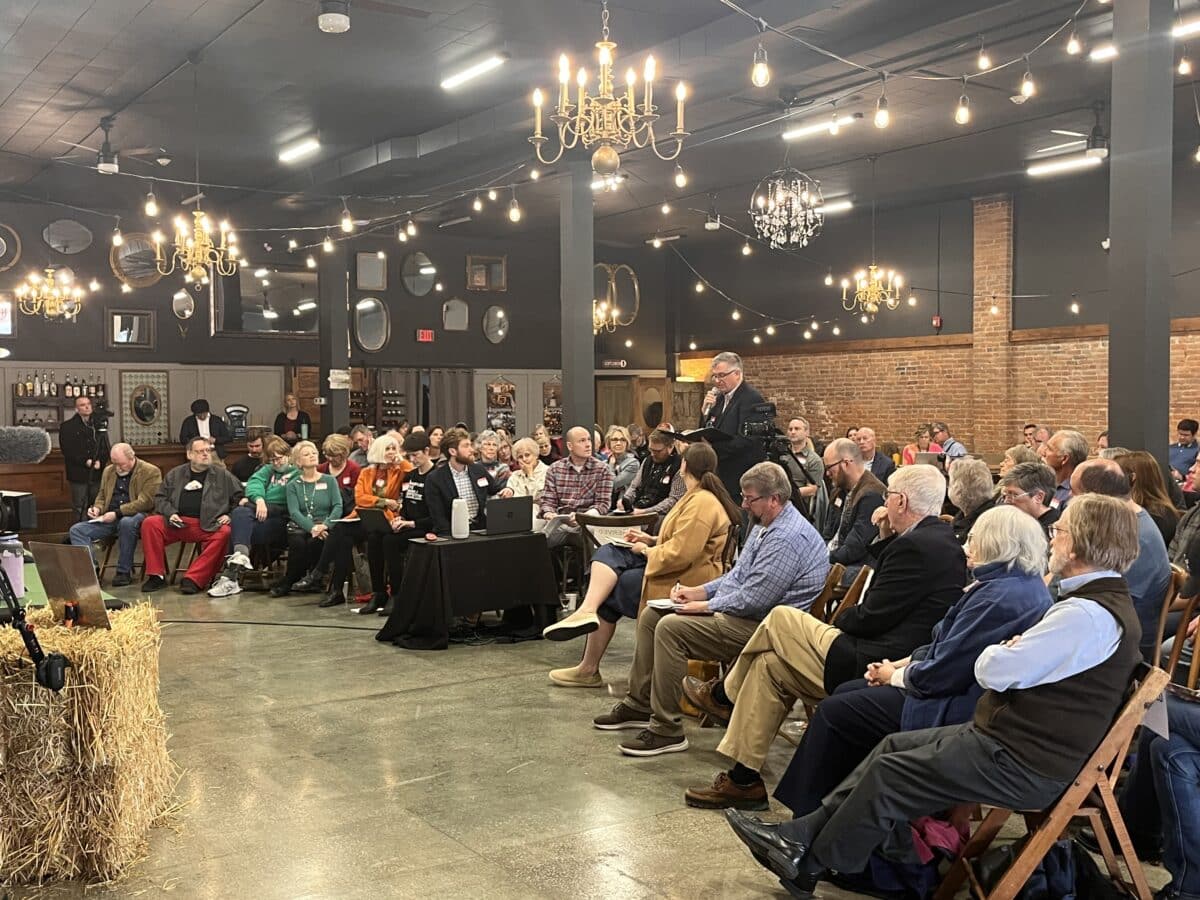On Saturday, April 20, U.S. Federal Trade Commission chair Lina Khan attended a listening session on the pending $3.6 billion acquisition of an Iowa fertilizer plant by Koch Industries, as leaders from the Iowa Farmers Union, the National Farmers Union and State Innovation Exchange joined more than 100 farmers urging the FTC to block the sale.
Farmers Tell FTC Chair to Block Koch Industries’ $3.6 Billion Acquisition of Iowa Fertilizer Plant
“We’re looking for intervention,” say farmers as ag industry consolidation fuels calls for antitrust action


The fertilizer plant, which opened in 2017 near Wever, Iowa, in the state’s southeast corner on the Mississippi River, received nearly $550 million in local, state and federal tax incentives to encourage its construction in the state and increase competition in the fertilizer market. Four companies, including Koch Industries, already control 75% of the U.S. nitrogen-based fertilizer market. Farmers are especially concerned about what the acquisition could mean for their fertilizer prices. In a 2023 U.S. Department of Agriculture public comment solicitation about fertilizer access, roughly nine in ten commenters described their concerns about high fertilizer prices and more than seven in ten expressed concerns about the power of fertilizer companies.
The proposed sale between Koch Ag & Energy Solutions, a Koch Industries company, and the Netherlands-based Orascom Constructions Industries (OCI), which owns the Iowa fertilizer plant, would likely only accelerate consolidation in the industry. The Iowa plant produces 3.5 million metric tons of nitrogen fertilizer annually, about 18% of the current national output. Moreover, the proposed sale comes at a time when production in the U.S. nitrogen fertilizer industry is expected to increase by over 50% in the coming years, driven largely by cheap domestic natural gas produced by hydraulic fracturing and the war in Ukraine, which has triggered natural gas sanctions on Russia, the world’s leading exporter of nitrogen fertilizer.
Despite temperatures hovering just below freezing, more than 100 farmers from Missouri, Minnesota and Iowa showed up Saturday morning in Nevada, Iowa, to voice their concerns. National Farmers Union President Rob Larew, Iowa Farmers Union President Aaron Lehman and Democratic Iowa state Reps. J.D. Scholten, Megan Srinivas and Eleanor Levin were seated at a panel near the front of the room.
The event began with opening remarks by the panelists, including Scholten, Srinivas and Levin, who had been in Des Moines until almost 4:30 a.m. wrapping up the 2024 legislative session. The three representatives were among the 30 Iowa House Democrats who sent letters earlier this year to the FTC, the U.S. Department of Justice’s Antitrust Division and Iowa Attorney General Brenna Bird, asking them to investigate the sale.
In his opening remarks, NFU President Rob Larew spoke to the concentration of the marketplace, calling capitalism without competition “exploitation.”
“We call it fairness for farmers but it’s also about fairness for consumers and really making sure that our communities can be lifted up in the way that they should be,” he said. “We’re not talking about asking for special spaces for farmers or for the markets. We’re looking for intervention in the market. What we know to be true is that when markets become too concentrated, we know that there is action manipulation, price fixing, et cetera. And that’s what this is all about.”
Khan began her remarks discussing her initial foray into antitrust work as a business journalist, where she investigated how competition in the market was working—or not working—for chicken farmers.
Since Khan’s appointment as chair of the FTC in 2021, she has helped redefine antitrust enforcement under the Biden administration. Last year, the agency succeeded in blocking several healthcare mergers and filed a high-profile lawsuit against Amazon, alleging the company engaged in monopolistic practices to unlawfully stifle competition. In March, the FTC sued to block Kroger’s $24.6 billion acquisition of its rival grocer Albertsons, the largest-ever proposed merger in the grocery market.
Public comment began with IFU President Aaron Lehman reading a letter from a union member who wrote-in anonymously due to fear of retaliation. The farmer wrote that although from 2021-2023 there was an increase in commodity prices, fertilizer prices rose, too. The letter writer requested an investigation into “possible market manipulation” of essential fertilizer inputs.
Farmers at the event echoed these concerns.

LaVon Griffieon is a fourth-generation family farmer who owns about 1,100 acres of land. With a stack of papers in hand, some bills and her own research, she began naming the big players who she “has to deal with”: Cargill, Bayer, John Deere, Syngenta, DuPont.
“Every time crop prices go up, their prices go up. We recently bought new tractor tires for our tractor and it cost us $20,000, which is what my parents paid for 80 acres in 1964.” She became emotional as she described the precarious future for her sons, the fifth-generation of family farmers. “We have the land to get our sons started farming, but we really can’t provide them with much else.”
Farmer John Gilbert asked Khan to look at the bigger picture of what’s happening in Iowa, where two commodity crops, corn and soybeans, dominate the landscape. Iowa is the nation’s largest corn producer and the second-largest soybean grower.
“I’m not going to be unkind when I say that Iowa agriculture is addicted to nitrogen. Right now, Iowa has the fastest growing rates of cancer in the country. Right now, over 700 of Iowa’s waterways are on the impaired list,” Gilbert said. “We’re having such influence from the commodity cartels and the agribusiness cabals that everybody thinks that’s all we can do, is raise corn and beans.”
Derek England, a row crop and small dairy farmer who travelled from Edina, Missouri, sourced fertilizer from the current Iowa plant that might be acquired by Koch Industries. When the plant opened, England said it had a “moderating effect on the price [of fertilizer].”
“Koch has always been the highest price [anhydrous ammonia] in our sourcing area. So this was rather worrisome when this came up, because we’re thinking, if Koch is pricing their anhydrous [highly] here, what is that plant going to be charging once Koch owns it?”
Harold Beach, a farmer who also came up from Missouri, told Khan that he would like her to be “fearless and courageous, and be a Teddy Roosevelt.” He likened her to a “referee in the ball game,” who has the ability to “call balls and strikes.”
Khan jumped in to clarify how the process will work. When an acquisition is proposed, if the FTC investigates, a company cannot go through with the sale until the investigation is concluded. She added that if the FTC determines the sale violates antitrust laws, they will file a lawsuit, but ultimately the court will be the “decision-maker.”
While Khan did not take a distinct stance on the pending sale, she noted that “if there ends up being a lawsuit,” farmers should consider “weighing in directly with the courts” as well.
In an announcement on December 18, 2023, OCI Executive Chairman Nassef Sawiris commented that the sale marked “an evolutionary step in our journey to create value for shareholders, and to enhance our focus on efforts in lower carbon initiatives.” That same day, Koch Ag & Energy Solutions president Mark Luetters announced that the purchase was “an important step forward for KAES,” as they further invest in fertilizer. They have not released any statements regarding the potential FTC investigation.
David Weaver farms 1,500 acres of corn and soybeans just northwest of Des Moines. He spoke to the strength of democracy and capitalism in the United States, but is worried about its fragility, especially as it relates to smaller farmers being able to speak up.
“When you’re a little guy you don’t want to talk,” he said. “I’m a farmer of a large enough operation. And I love this. I can tell someone to go pound sand whenever I want.”
The final commenter, farmer Tony Thompson from Elkhart, Iowa, became emotional when he began discussing his earliest memories of being in the tractor or the combine with his dad, 40 years earlier. He urged Khan to “connect the dots” between industry consolidation and farmers’ struggle to make ends meet.
Khan wrapped up the event by thanking farmers for speaking out, especially given potential retaliation. In an interview with Barn Raiser, Lehman explained that potential retaliation could look like suppliers asking certain farmers to pay higher prices than others if they do not agree with their stance. Additionally, fertilizer suppliers tend to live in the same, tight-knit communities as farmers, and being outspoken on issues can be socially isolating.
“To be honest,” Lehman said, “we know there are some big players in the ag industry who have said you won’t be offered a contract at all next time.”
However, Saturday’s event proved that farmers have allies throughout the Midwest on this issue, and may even find an ally in the FTC.
“It has been such a priority for me at the FTC to ensure that our decisions are informed not just by models and economist’s assumptions about what’s going to happen, but actually by real people’s stories,” Khan said. “I’m just really looking forward to our continued engagement.”
Nina Elkadi is a writer from Iowa who reports on the intersection of climate change and agriculture. Her work also explores the manipulation of science and how corporate negligence affects consumers and workers.
Have thoughts or reactions to this or any other piece that you’d like to share? Send us a note with the Letter to the Editor form.
Want to republish this story? Check out our guide.
More from Barn Raiser

Democrats, There’s a Way Out of The Political Mess We’re In







